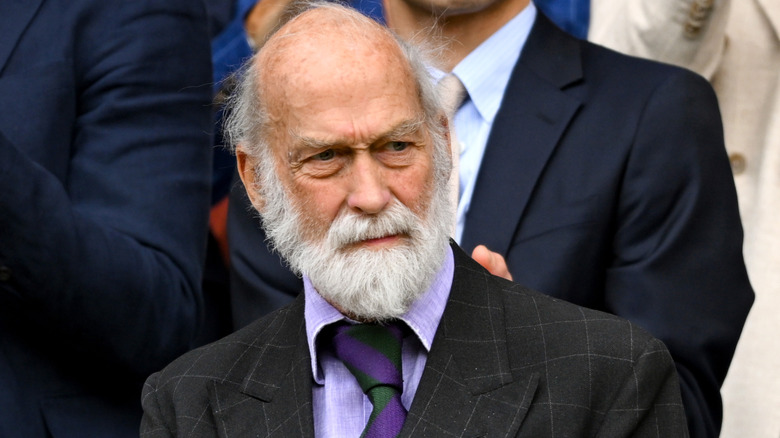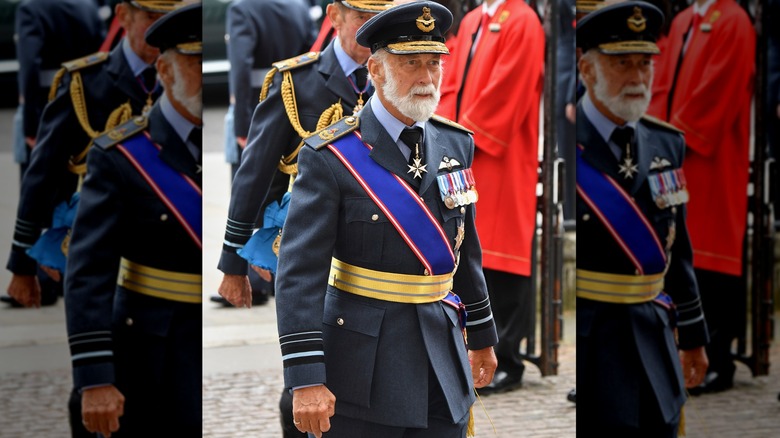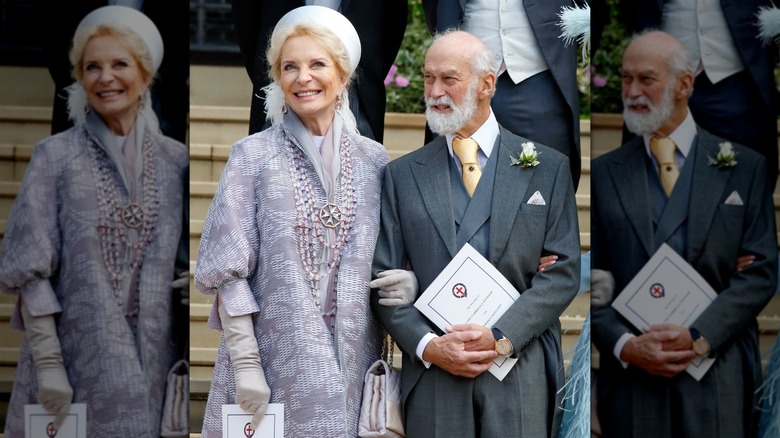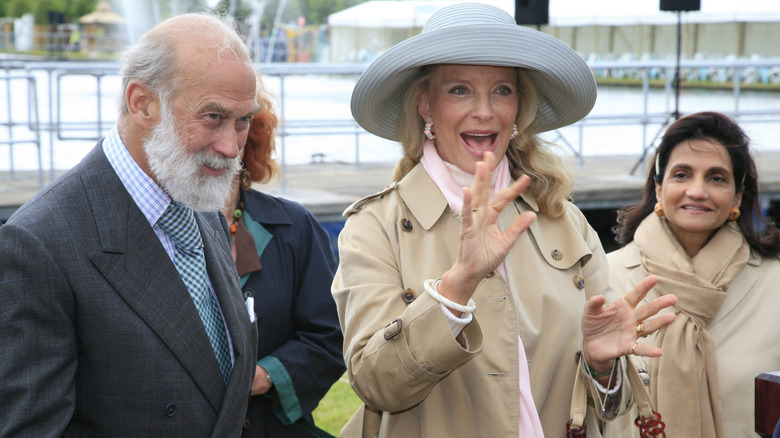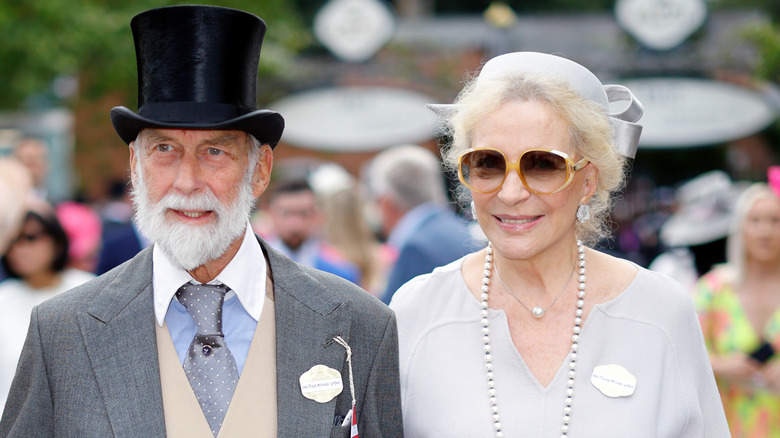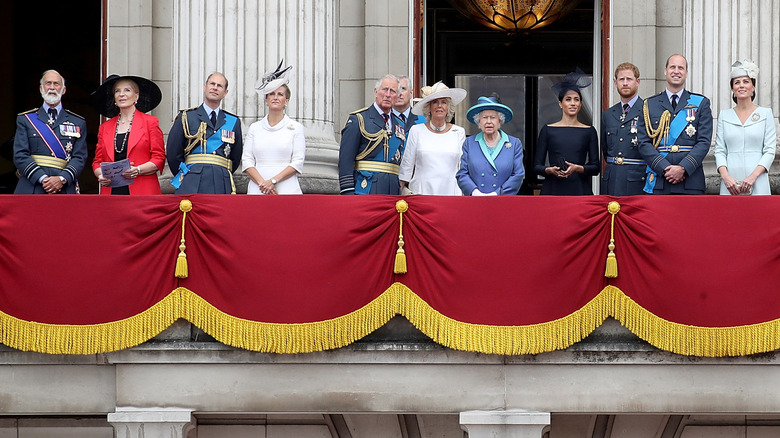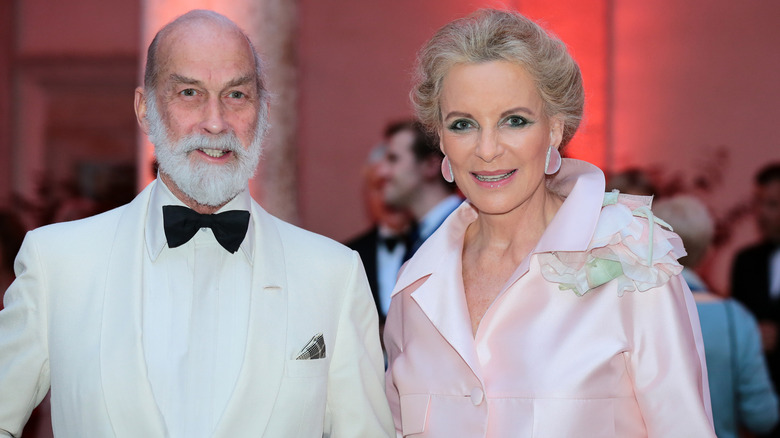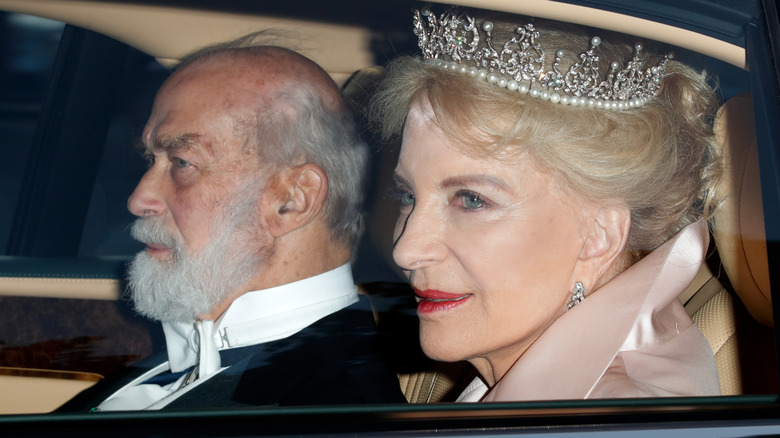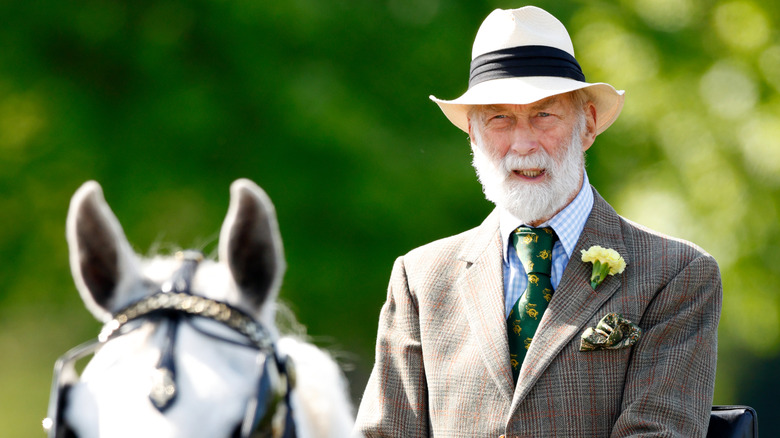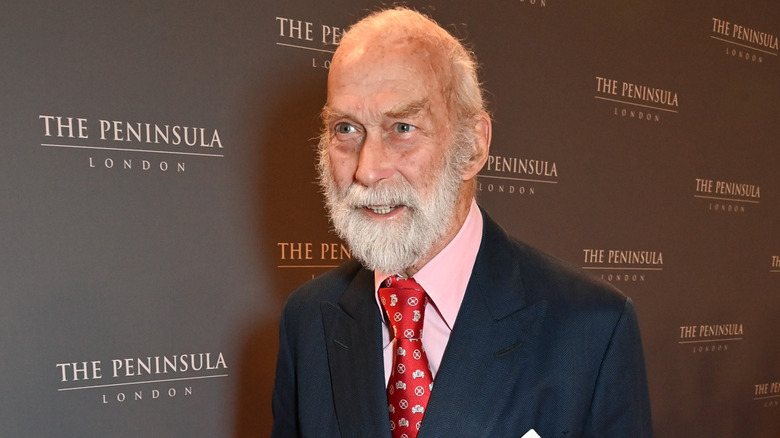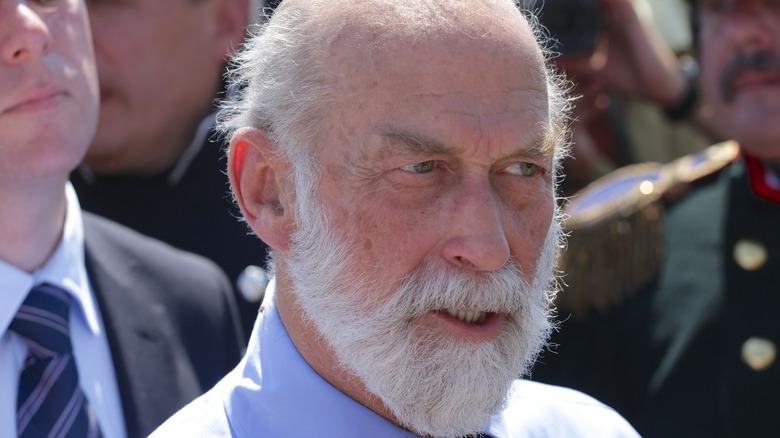How Prince Michael Of Kent Made His Millions On His Own
Prince Michael of Kent may not be one of Britain's most highly-ranked royals, but he is certainly one of the most interesting members of the royal family. Born in 1942 to Prince George, Duke of Kent, and Princess Marina of Greece and Denmark, Michael was originally seventh in line to the throne. As one of Queen Elizabeth II's beloved first cousins, he was invited to take on important roles at family events. When Queen Elizabeth married Prince Philip in 1947, the 5-year-old Michael was a page boy in their wedding. Later, at the queen's coronation, the young Michael made yet another appearance — this time, decked out in an adorable Scottish kilt.
As the decades have whizzed by, however, Michael's role in the royal family has decreased. As of 2024, he is 52nd in line to the throne, and his distance from the crown has prevented him from receiving public funds. That being said, Michael has come up with a number of strategies to keep his coffers full. According to a report by the Express, the prince's fortune is estimated to be worth approximately $40 million — a stunning sum for someone who has largely had to make his own way. Oddly enough, though, there have been whispers surrounding Michael's wealth, as much of the prince's money has not been scandal-free. Some of it might even come from less-than-legal sources.
Prince Michael of Kent started his career in the military
Although much of Prince Michael of Kent's fortune has been called into question, not all of his financial activities have necessarily been scandalous. Michael was one of the many royals to pursue a military career. He headed to the Royal Military Academy Sandhurst in 1961. From there, he was dispatched to be a part of the United Nation's peacekeeping troops. He spent the first decade of his duties working internationally in Hong Kong, Cyprus, and Germany.
Around this same time, Prince Michael developed an interest in Russian language in culture. As a first cousin twice-removed to the late Tsar Nicholas II, Michael found himself increasingly curious about his roots. Thus, he enrolled in Russian classes at the Defense School of Languages and even embarked on an exchange program, where he resided with a Russian family living in Paris. In 1968, Michael passed the examination necessary to become a military translator and interpreter.
Although the public knows little about how the prince has used this certification, we do know that he went on to become a member of the British Defence Intelligence Staff. This role ostensibly offered Michael a stable source of income over the course of decades. Considering that he was promoted four times throughout his career, the prince did quite well in the military. By the time of his 1981 retirement, Michael had obtained the rank of "major" — and the decent salary that went along with it.
His wife, Princess Michael of Kent, worked as a successful interior designer
Prince Michael of Kent was not the only member of his family to start out his career in a fairly traditional way. His wife, Princess Michael of Kent (who is also known by her first name, Marie-Christine), is also among the royals who work a regular job. Marie-Christine originally moved to London in 1968 with the goal of becoming an interior designer. She enrolled in fine and decorative arts courses at the Victoria and Albert Museum. From there, she took on five years worth of internships.
Once Marie-Christine was finally feeling ready, she founded Szapar Designs Limited, an interior design company which she ran from 1974 to 2023. Her business proved quite successful, attracting important clients such as Moscow's Baltschug Kempinski hotel. As she gained more experience as a designer, Marie-Christine found that she was most interested in working on historical British homes. On her personal website, she shared, "I would say that John Fowler had the most influence on my work as I studied the restoration of 17th and 18th century English manor houses."
By the time she married Prince Michael in 1978, Marie-Christine was a full-blown businesswoman with a deep understanding of her area. After becoming a princess, she was even able to use her knowledge to restore part of Kensington Palace that, in her words, "had not been touched since basic restoration following a direct bomb hit during WWII."
Prince Michael of Kent's wife is also a published author
Princess Michael of Kent's professional pursuits have not just been limited to the design world. She is also a published author who has written four non-fiction and three fiction books. In 1991, she released her debut work, "Cupid and the King." This piece of non-fiction tells the real-life stories of five royal mistresses, each of which had a very different impact on British society.
Although most of Princess Michael's published works are considered history books, she has also dabbled in the world of historical fiction. In 2013, she launched "The Queen of Four Kingdoms" — a sizzling romance about the French royal family — which ultimately turned into trilogy. For fans looking to know more about her life, she even published a juicy royal memoir, detailing her time caring for cheetahs in Africa.
It's unclear how much money Princess Michael earned from her book sales, but it does appear that her fame as a history writer has allowed her to pursue a career as a professional speaker. Her interest in the royal families of the past — combined with her role in the British monarchy — has encouraged many organizations to hire her as a lecturer. The princess has been considered successful in this area and currently offers talks on themes ranging from 16th-century Italy to 19th-century France.
Prince and Princess Michael of Kent owned a consultancy business
Following their 1978 wedding, Prince and Princess Michael of Kent decided to go into business together. The couple launched a small consulting company called Cantium Services, which would apparently help other businesses increase their profits. Although not much is known about the services offered by the Kents' company, a 2022 sting operation revealed some less than flattering details about their organization.
In 2021, journalists from The Times posed as potential Cantium clients and set up a Zoom call with Michael. During this meeting, the prince's colleague, Marquess of Reading, told the journalists that Michael could put them in contact with Russian president, Vladimir Putin, for the hefty price of £10,000. Beyond selling access to the foreign ruler, Michael said that he could make a video endorsing the journalists' fake gold company. He reportedly offered to use his Kensington Palace apartments as the video's background — so long as his so-called "clients" paid him $200,000.
This conversation proved quite scandalous, as British royals are strictly prohibited from using their titles or status to make a profit. In this situation, it seemed that Michael was willing to capitalize off of his name and place of residence as a way to earn an astounding amount of money. He also appeared interested in trading off of some of his international connections — something that is highly frowned upon. The Kents were forced to shut down their business months after the scandal.
The Kents were accused of cashing in on their royal status to travel the world
The journalistic sting operation was not the only time that Prince and Princess Michael of Kent were accused of using their royal titles for privileges. Over the years, the couple has saved massive amounts of money by traveling on other people's dime. In 2001, The Guardian reported that Prince and Princess Michael had gone on 20 luxurious trips, each of which had been paid for by different organizations. Per the newspaper, the couple's travels had taken them to a broad range of countries, including Australia, Peru, and the United States.
While there would be nothing inherently wrong with a normal citizen accepting travel vouchers from important organizations, the same is not necessarily true for Prince Michael and his wife. As British royals, it is their duty not to use their titles to obtain any sort of special gifts or experiences — including travel. According to The Guardian, British ministers believed that the Kents were "sailing too close to the wind" in terms of cashing in on their rank.
Interestingly, in years prior to this scandal, a spokesperson for Michael had previously claimed that his activities were acceptable, stating, "Both Prince Michael and the princess go out of their way not to mix their private business with their work for charities or trade organizations ... He can either make a living for himself and be criticized, or he can live off the public purse and be criticized."
Prince and Princess Michael of Kent have benefitted from royal favors
Beyond just using their royal titles to travel, Prince and Princess Michael of Kent have reportedly used their status to enjoy extra privileges while on their travels. This was especially true in 1996 when Michael made headlines for reportedly using the British embassy in Beijing as his personal hotel room. As reported by The Guardian, the prince slept at the embassy — despite the fact that he was not in China on any sort of diplomatic capacity. On the contrary, he was there to conduct business, meaning that the British taxpayer should not have been responsible for footing his hotel bill.
Although the prince did try to defend himself via a spokesperson, his statement only reinforced the idea that he likes to stay in embassies whenever he can. As his representative told the press, "Where we have stayed in embassies it has been firstly at the invitation of the ambassador and secondly where Prince Michael has been doing something for a charity, or for British trade."
Beyond just occasionally sleeping in embassies, Prince Michael and his wife have been known to use their VIP status in airports. They also have the right to taxpayer-funded police protection, both in the United Kingdom and on their international trips. Considering that this is the very security right that Prince Harry and Meghan Markle have been denied, the Kents can consider themselves very privileged indeed.
The Prince and Princess of Kent got decades of free rent
It's no secret that paying rent in London can be pricey — not that this was always a problem for Prince and Princess Michael of Kent. For approximately three decades, the couple enjoyed near rent-free living in Kensington Palace due to their proximity to Queen Elizabeth II. According to the Kents, Elizabeth offered them apartment number 10 — a stunning unit boasting five opulent bedrooms — as a wedding present in 1978. Although the couple was not meant to pay the full price of rent, they reportedly offered the palace a symbolic value of £69 per week.
Naturally, when this information came out, many British taxpayers were enraged. Not everybody felt that they needed to fund the lavish lifestyle of one of the queen's lesser-known cousins. Buckingham Palace, however, was quick to come to the Kent's defense and even released a statement, reading, "The queen is paying the rent for Prince and Princess Michael of Kent's apartment at a commercial rate of £120,000 annually, from her own private funds. This rent payment by The Queen is in recognition of the Royal engagements and work for various charities which Prince and Princess Michael of Kent have undertaken at their own expense, and without any public funding" (via the Mirror).
Despite this attempt to keep the apartment rent-free, Prince Michael and his wife told the public that they would pay their own way in 2008.
Prince Michael may have used tax loopholes to save money
Beyond saving money on Kensington Palace rent and royal favors, Prince Michael of Kent might have kept costs down via a tax loophole. As reported by the Daily Mail, Michael's former company, Cantium Services, reported gross profits of over £400,000 per year for three years in a row between 2016 and 2018. In spite of this, the company did not pay taxes, as its earnings did not manage to outweigh massive business expenses.
Per the Daily Mail, Cantium Services paid high salaries to its employees, including presumably Michael and his wife, Princess Michael of Kent. It also spent over six-figures on expenses, like car rentals and employee travel. For this reason, company documents claimed "no liability to [pay] U.K. corporation tax." Although this may have seemed odd — as the Daily Mail pointed out — the British government did not see any need for concern.
Interestingly, this was not the first time that the Kents' tax status was put into question. In 2015, a document leak revealed that the couple had access to a secret Swiss bank account in the name of Cantium Services Limited. As the Daily Mail reported at the time, the prince and princess did not deny the existence of the bank account. However, their spokesperson told the press that the account in question had been closed since 2009 and "never received nor held any funds."
The prince received payments from a Russian oligarch
Cantium Services was not Prince Michael of Kent's only source of income in the early 2000s. The British royal also received a number of payments from the Russian oligarch, Boris Berezovsky, between 2002 and 2008. As reported by the The Times, Berezovsky paid Michael every two weeks, sending the prince between £5,000 and £15,000 in each installment.
Following this revelation Michael and Berezovsky insisted that there was nothing inappropriate about the funds exchanged. The Russian oligarch went so far as to tell The Times, "There is nothing underhand or improper about the financial assistance I have given Prince Michael. It is a matter between friends." However, the fact of the matter is that the duo originally tried to hide the payments from prying eyes. Berezovsky did not even send the money directly to Michael, wiring it to a business controlled by the prince's private secretary instead.
Although it remains unclear whether or not Berezovsky was paying Michael for some kind of service, it has been suggested that the oligarch had hired the prince to help him make friends in Britain. As a London outsider, Berezovsky did not have many connections in the U.K. when he moved there in 2000. Rumor has it that he hired Michael to facilitate his transition into elite society, however, there is no way to confirm if this is true.
Michael of Kent was a brand ambassador for RemitRadar
Among his many business ventures, Prince Michael of Kent worked as a global brand ambassador for the FinTech company, RemitRadar. Founded to help migrants send money back to their home countries with maximum security, RemitRadar touted a very humanitarian goal. In 2016, Michael expressed excitement at all that the company strove to achieve. "I will be delighted if my role helps these people retain more value and enjoy more security when sending money home," he said (via Finextra). In fact, the prince believed so strongly in RemitRadar that he reportedly acquired a 1% stake in the business.
As charitable as Michael's involvement in RemitRadar may seem, however, his ties to the company have not been entirely scandal-free. In 2023, The Times reported that Michael had used his personal connections with the British Foreign Office to expedite a visa for a Russian national by the name of Maxim Viktorov. As per the same journalistic investigation, Viktorov was in the process of investing £100,000 in RemitRadar at the time of the prince's diplomatic intervention. Naturally, this coincidence proved concerning for many, as it appeared that Michael had once again traded off of his royal connections in order to propel his business interest forward.
